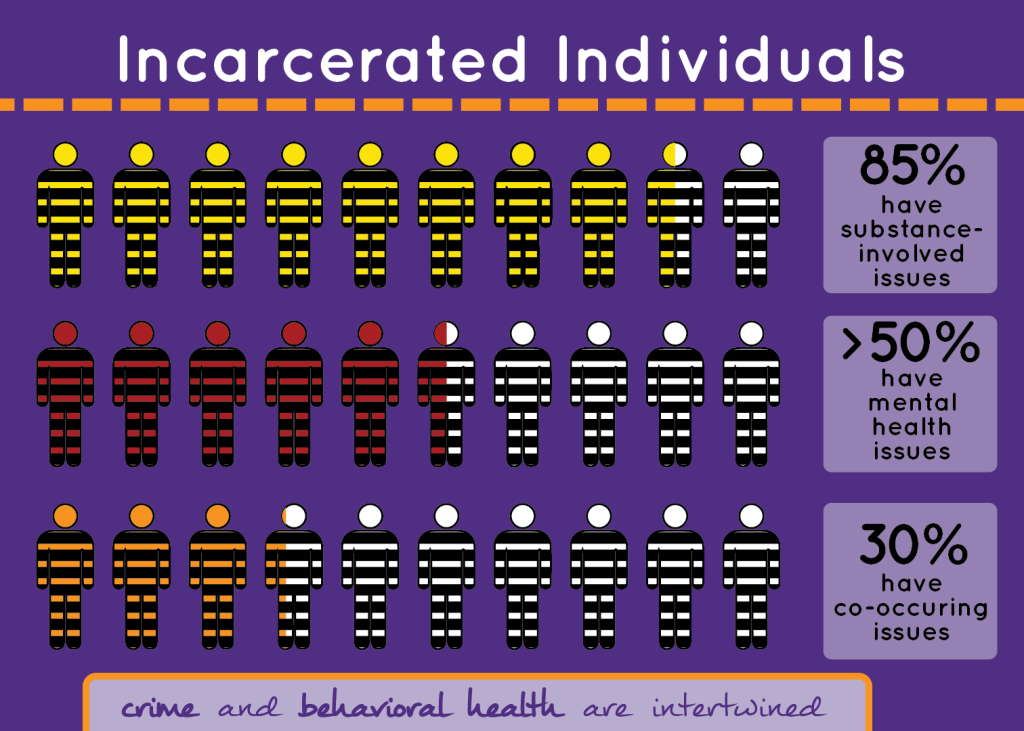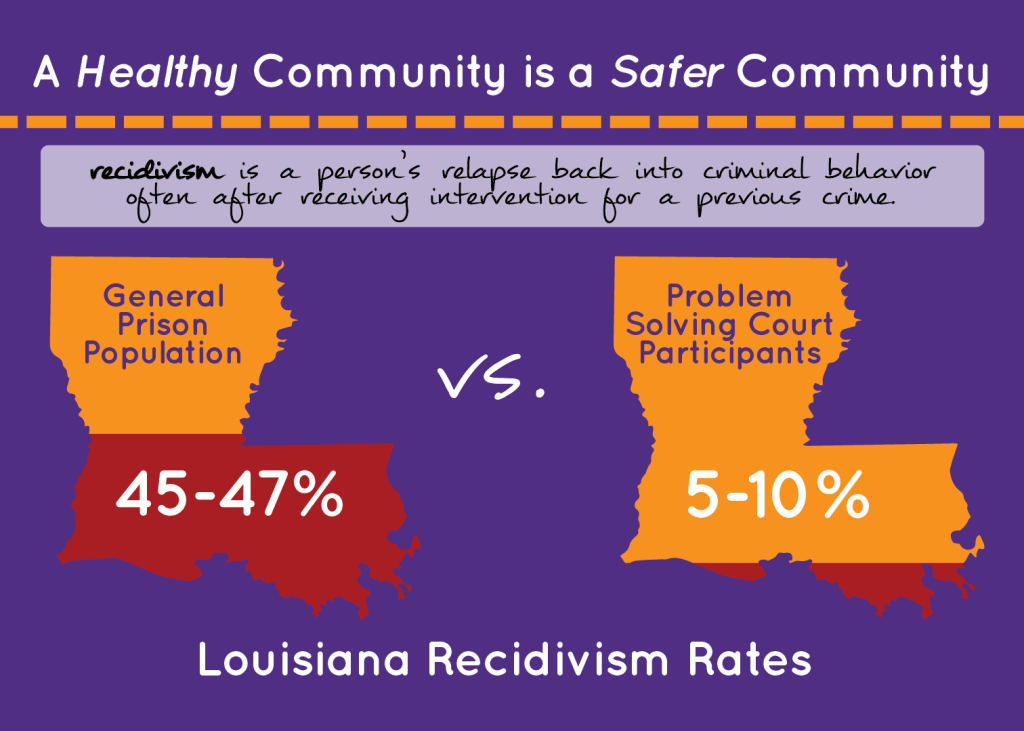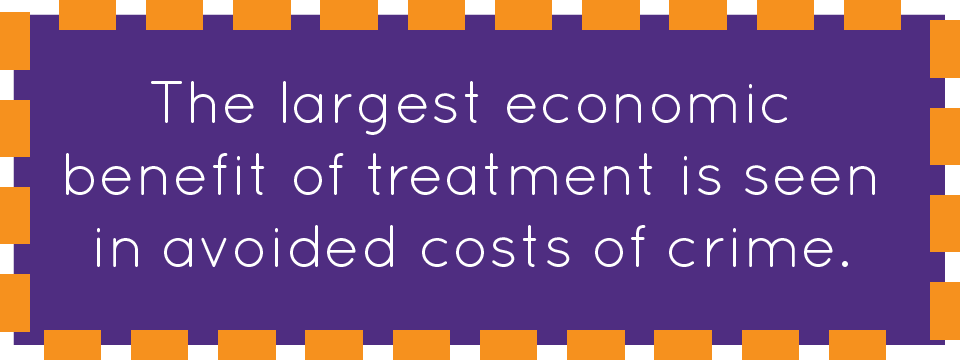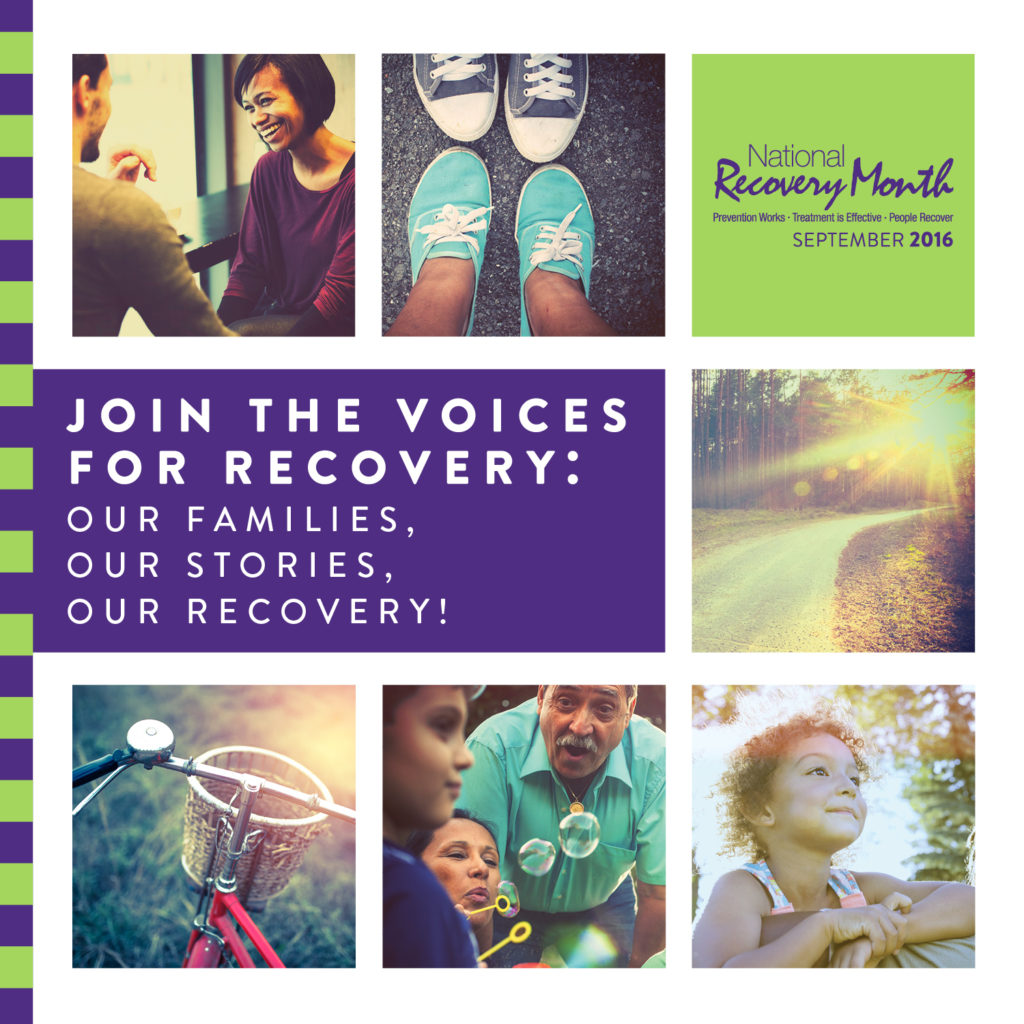Recovery
National Recovery Month is spearheaded by SAMHSA (Substance Abuse and Mental Health Services Administration), the agency within the U.S. Department of Health and Human Services that leads public health efforts to advance the behavioral health of the nation. SAMHSA’s mission is to reduce the impact of substance abuse and mental illness on America’s communities. Its Strategic Initiatives help:
- provide treatment and services for people with mental and substance use disorders,
- support the families of people with mental and substance use disorders,
- build strong and supportive communities,
- prevent costly behavioral health problems,
- promote better health for all Americans.
The Purpose
- to promote the societal benefits of prevention, treatment, and recovery for mental and substance use disorders,
- to celebrate people in recovery,
- to laud the contributions of treatment and service providers,
- to spread the positive message that behavioral health is essential to overall health, that prevention works, treatment is effective and people can and do recover.
“As far as what is the face of mental health…you’re looking at one of the faces of mental health and mental illness recovery. I myself am in recovery for addiction as well as mental health issues.”
—Tom Rowan
In Recovery more than 20 years after a failed suicide attempt NAMI St. Tammany case manager for the 22nd Judicial District’s Behavioral Health Court.
Videos
District Judge Peter J. Garcia, who presides over Behavioral Health Court at the Covington courthouse, talks about why the court is needed, how it came to be, and how it works.
Behavioral Health Court Cuts Jail Costs, Helps Mentally Ill Find Help
COVINGTON—By noon each Wednesday, Louisiana District Court Judge Peter J. Garcia and his team are gathered around a conference room table and ready to begin. There are 16 team members—social workers, probation officers, attorneys, mental health advocates, and court staffers, most of whom will have a say before the one-hour session ends. Read More
Tony LeMon, Chief of the Civil Division and head of the Diversion Program in the 22nd Judicial District, talks about the work of St. Tammany Parish’s Behavioral Health Task Force and its plans for addressing the state of mental health in the region. LeMon also shares why he is so personally passionate about the issue of mental health.
District Attorney Warren Montgomery of the 22nd Judicial District talks about the importance of mental health and recognizes National Recovery Month.
Social worker Susan Johannsen, who has worked with mentally ill patients in the St. Tammany parish jail since 1989, talks about the mental health crisis in the region.
And More statistics.

“I was in a very stressful job and trying to be the perfect mom and perfect wife and just put a lot of pressure on myself to get things done and just stared to feel myself slowly slip away. Didn’t really understand what was happening to me. No one recognized what was going on. I eventually became psychotic.”
Tracey Boudreaux
In Recovery for Mental Illness
NAMI St. Tammany Board member
Crime and Behavioral Health are Intertwined

Louisiana has the highest incarceration rate of any state. Nearly 40,000 persons are incarcerated, with the cost of prisons exceeding 546 million dollars in 2013. St Tammany incarcerates more of its citizens per head than any other Parish in Louisiana.
- 25% of new arrests suffer from serious mental illness (excluding drug abuse)
- 60% of all inmates have illicit drugs in their system at the time of arrest
- 85% of all arrestees have substance abuse problems
- 3 out of 8 individuals in jail are on suicide watch (45-60 per month)
Source: Behavioral Court Program and the Northshore Court Foundation
“I often share a picture of a kindergarten class in Mandeville from the mid- to late 60s, and I tell the story about two kids, one named Tommy and one named Timmy… Tommy and Timmy were the best of friends. They did everything together. They were probably closer than their own brothers. But what Timmy didn’t realize was Tommy was fighting this gripping depression, and on Timmy’s 16th birthday, Tommy committed suicide. Well, I’m Timmy. That was my best friend in the world, and I didn’t have a clue, and ever since then, I’ve had this hole in my heart…”
Covington Police Chief Tim Lentz
Former Chief Deputy for the St. Tammany Parish Sheriff’s Office
Our community is actively involved in resolving these issues. This month we seek to educate, inform, highlight and honor the work being done to assist those in need in our community; see below links to resources and information.
Given the high prevalence of people with mental and substance use disorders involved with the justice system, District Attorney Warren Montgomery has prioritized this population. We recognize that behavioral health treatment and recovery support services are critical but also need to be balanced with the community’s priority of public safety.
The District Attorney’s Office wholeheartedly supports treatment and recovery efforts for people in the criminal and juvenile justice systems with mental and/or substance use disorders. We also support all efforts to help those suffering and in recovery to prevent future crime.

Cost Benefits

- Nationwide, for every $1.00 invested in Specialty Courts, taxpayers save as much as $3.36 in avoided criminal justice costs alone*.
- When considering other cost offsets, such as savings from reduced victimization and healthcare service utilization, studies have shown benefits range up to $27 for every $1 invested*.
Source: NADCP – National Organization for Drug Court Professionals
Behavioral Health Task Force The Louisiana Public Health Institute (LPHI) partnered with the St. Tammany Parish Government and the St. Tammany Behavioral Health Task Force over an 18-month period to conduct a systems assessment of the behavioral health service delivery system in St. Tammany Parish. The primary purpose of this project is to:
- Determine the current state of behavioral health needs and services
- Develop a plan to improve and sustain the behavioral health service delivery system
- Establish an online dashboard of up to date behavioral health data to inform decision makers
View “It’s OK to Talk About It,” a video produced by St. Tammany Parish Government to spotlight the St. Tammany Parish Behavioral Health Task Force, those affected directly by mental illness, how mental illness impacts our community, and the resources available to citizens in St. Tammany Parish who are in need of behavioral health care on any scale.
Volunteers of America – Crisis Response Team – Crisis Response Intervention Through a partnership with the St. Tammany Parish government, help is available for individuals experiencing emotional and mental health difficulties to reduce rates of readmission to the emergency room. For more information call 985-674-0488.
St. Tammany Outreach for the Prevention of Suicide (STOPS) announces its June 2014 training session offerings for people concerned about family or friends, emergency service workers, counselors, teachers, ministers, mental health practitioners, law enforcement workers and community volunteers. The emphasis is on suicide first aid.
Mental Health First Aid Training: www.MentalHealthFirstAid.org
NAMI, the National Alliance on Mental Illness Our Nation’s largest grassroots mental health organization dedicated to building better lives for the millions of Americans affected by mental illness. NAMI advocates for access to services, treatment, supports and research and is steadfast in its commitment to raising awareness and building a community of hope for all of those in need. View: NAMI’s, Jailing People with Mental Illness
NAMI is working with Stepping Up – A National Initiative to Reduce the Number of People with Mental Illnesses in Jail


